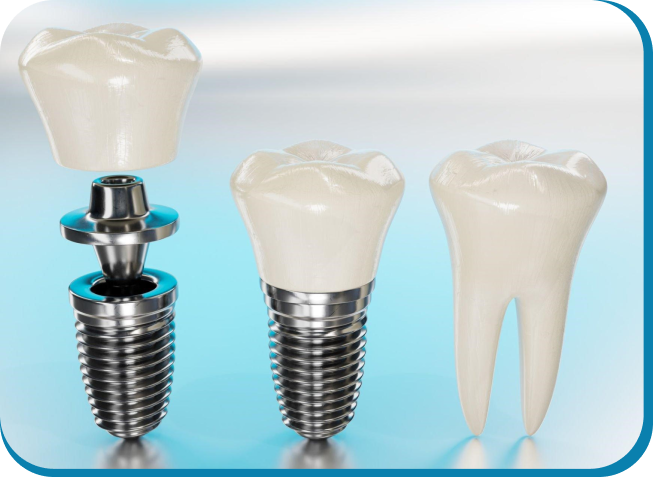Dental Implants Treatments
Postoperative Care
Dental Implant Treatments: Post-Operative Care
Following your doctor’s recommendations throughout dental implant surgery is critical to a healthy outcome. If you do not follow their advice, you may encounter issues including jaw discomfort, increased infection risk, or even implant displacement. Natural teeth are the greatest choice for a beautiful smile.

What are Dental Implants?

They offer advantages including stability, improved chewing ability, and jawbone health maintenance, all while closely replicating the appearance and function of real teeth. While dental implants are not suitable for everyone, they can offer a long-term solution that can significantly enhance both oral health and appearance.
What are the Reasons Dentists Suggest for Dental Implants?
- Permanent Solution
- Improved Chewing and Speaking
- Preservation of Jawbone
- Natural Appearance
- No Damage to Adjacent Teeth
- Enhanced Comfort
- Boosted Self-Confidence
- Easy Maintenance
- No Slippage or Movement
- Bone Health
- Minimal Impact on Speech
- Versatility
- Improved Quality of Life
- No Dietary Restrictions
Prepare yourself before getting dental implants?
Research and education:
Consultation:
Dental Exam:
Health Optimization:
Smoking cessation:
Oral hygiene:
Rest and Relaxation:
Get a good night’s sleep before the procedure and try to be relaxed. Anxiety may have an impact on the procedure.
What to Do and Don't After Getting Dental implants?
Things you should follow
Oral hygiene:
Prescribed Medication:
Take any antibiotics, pain relievers, or other medications that your dentist has advised. Follow the indicated dose and schedule.
Swelling and discomfort:
It is not uncommon to have swelling, bruising, or pain after surgery. To reduce swelling, use cold compresses as directed by your dentist.
Oral Rinse:
Use an antibacterial or saline rinse as prescribed by your dentist to keep the surgical site clean.
Sleeping Position:
Lift your head slightly when sleeping to reduce edema.
Normal Routine:
As you recover, gradually resume your normal daily routine and activities.
Regular dental visits:
Keep all follow-up visits with your dentist or oral surgeon as scheduled. They will monitor your healing progress and address any concerns that emerge.
Monitor for Complications:
Keep an eye out for infection symptoms such increased swelling, pain, or discharge. If you see anything out of the norm, call your dentist.
Follow your dentist's instructions
Always follow your dentist’s or oral surgeon’s post-operative care instructions, which are customized to your specific situation.
Things you should avoid
Dietary Restrictions:
Initially, stick to a soft diet to avoid putting too much strain on the implant site. As you recover, gradually reintroduce solid foods.
Avoid Tobacco and Smoking:
If you smoke, stop doing so throughout the early healing phase. Tobacco smoking may hinder healing and increase the risk of complications.
Avoid Hard and Sticky Foods:
Firm, crunchy, or sticky foods may injure the implant or irritate the surgical site.
Avoid Alcohol and Hot beverages:
Avoid alcohol and hot beverages for the first few days of recuperation since they may interfere with the process.
Activity and Rest:
Avoid strenuous physical activity for the first several days after surgery, and rest as needed.
Avoid Touching the Surgical Site:
To avoid infection or interrupting the healing process, do not touch the implant site with your fingers or tongue.
Avoid Sucking or Spitting:
Activities such as using straws or spitting aggressively should be avoided since they might cause suction and disrupt the healing region.
Conclusion
Furthermore, regular follow-up sessions with the dentist enable for the monitoring of development and timely resolution of any issues. Finally, by focusing on post-operative care, patients can benefit from the long-term advantages of improved dental function and aesthetics.
